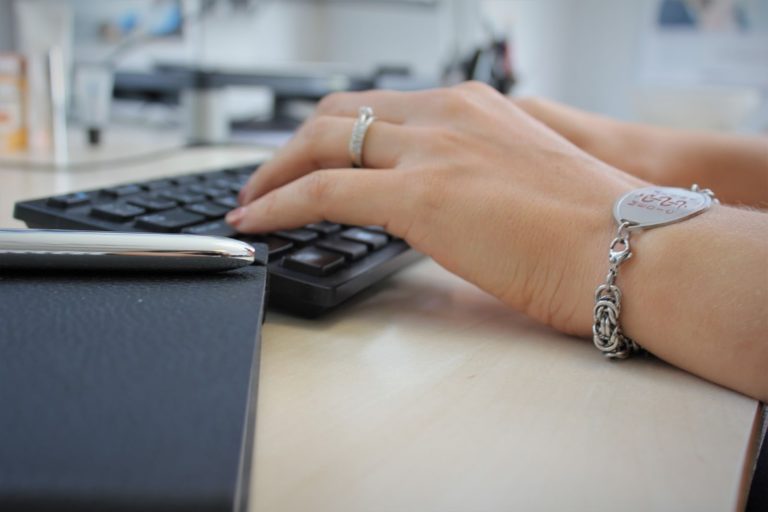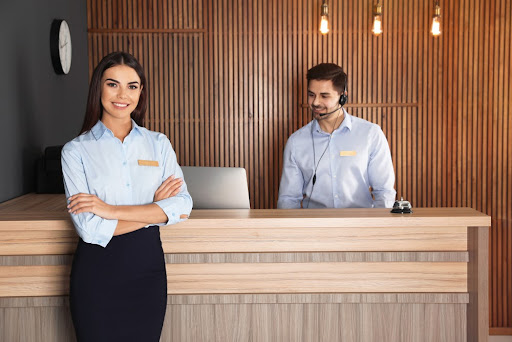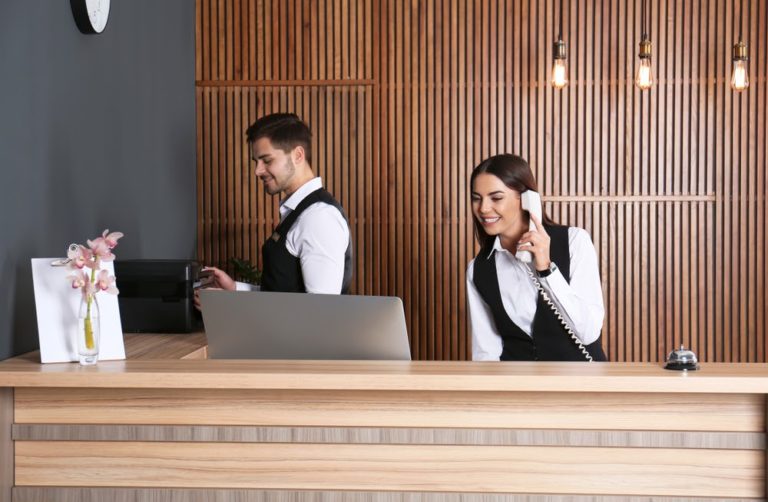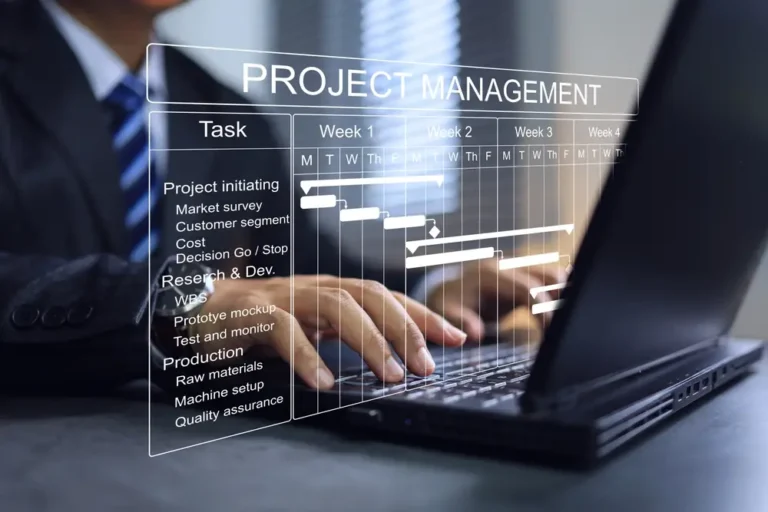- Home
- Career Development
- Stand out with Top Needed Receptionist Skills
Stand out with Top Needed Receptionist Skills

There is a saying that, “First impression is the last impression”. And a receptionist gives the very first impression to the clients. They create not only a welcoming environment, but also a professional image with their receptionist skills. A warm welcome can always melt people’s hearts.
As a receptionist, you will have a lot of responsibility on your hands, and it can never be just broken down or simplified to “front desk job” alone. In this blog, you will learn about top needed receptionist skills and how to implement them in your workplace.
What is the Job Description of a Receptionist?
Receptionists have to do a wide range of work activities. The job description is the following:
- Greet and welcome the visitors
- Inform the relevant officials about visitor’s entrance
- Assist guests and serve their needs
- Receiving, answering, and transferring phone calls
- Answer the inquiry of the clients or any other visitor directly, or over the phone.
- Monitor company’s security system
- Logbook management and management of meeting rooms
- Keep reception area neat and clean at all times
- Maintaining office supplies such as stationery, tools and furniture
- Receiving and sending deliveries
- Assisting HR team with the recruitment, onboarding and other processes
The above-written job profile will fit into the job responsibility of a receptionist working in any industry.

Top Needed Receptionist Skills
Being a receptionist requires a well-rounded combination of skills. Here is a list of the key skills to master for adding maximum value as a receptionist:
- Communication skills
- Interpersonal skills
- Technical skills
- Multitasking
- Organisational skills
- Problem-solving skills
- Ability to maintain a positive attitude
1. Communication Skills
Ask yourself, how well do you communicate? Because communication skills are at the heart of this job. Firstly, you need to read the body language of the visitors. As a receptionist, welcoming visitors with smiling faces is of undeniable importance. You have to make them feel comfortable and valued. Such non-verbal communication skills will ultimately help to maintain a great image of the company that you are representing.

Secondly, the primary task of this job is to make verbal communication. You have to communicate with visitors and respond to their enquiries. Thirdly, your writing skills will help you in this job. You have to register visitors’ entries, take necessary notes, and answer emails of the visitors and clients.
2. Interpersonal Skills
A person uses interpersonal skills to interact with others effectively. It is the behaviour or tactics that can make you a better professional in the business world.
Examples of some important interpersonal skills are active listening skills, confidence and work etiquettes.
Active Listening
You need to train yourself to become a focused and active listener. That way, when people speak to you, they will feel assured that their concerns are being told to the right person. Repeating instructions is another thing people typically don’t like to do. So making sure that you get it right at one go will take practice on your end, but ultimately pay off in the end.

Listening is a super quality that goes hand in hand with excellent communication. We all love being articulate and expressive. But listening to the ideas of others carefully is a quality that we tend to overlook. Whereas, being listened to is something that people around us deeply value. So, listening skills will help you with your clients, boss, and colleagues. Because being listened to makes anyone feel respected and valued.
Confidence
Confidence is the key to success. It will help you to perform better, increase your resilience and open you to learning new things. In addition, it will lead you to communicate with others more efficiently. While, if you are not confident, no matter how much skill you have, you will struggle at the reception desk.
Work Etiquettes
How can you be an excellent professional without maintaining etiquette? In simple words, you can’t.
Here are a few examples of the most common work etiquettes. Firstly, you have to arrive timely at your workplace. As a receptionist, it’s better if you come to the office earlier than any other employee. Secondly, you should wear something neat and clean. A traditional look for your outfit is usually always a safe choice. Clothes of relatively neutral shades are usually more suitable in a professional setting. Thirdly, keep a harmonious relationship with your colleagues. Keeping up a positive ambience at the office front will solely depend on you as a receptionist. And staying sincere about these work etiquettes will help you achieve that.
When you are working as a receptionist, you should remember that you are the eyes and ears of your company. Therefore, practising soft skills can be crucial for protecting your reputation and image. Finally, use your receptionist skills to maintain a healthy relationship with the other employees throughout all tiers at your office.
3. Technical Skills
As a receptionist, you should have good technical skills. Firstly, getting comfortable with phone systems, photocopy machines and printers is important. Secondly, computer skills and efficiency will help you to stand out. Finally, you should know using computer software programs and contact visitors through email as a good receptionist.

Lastly, if you are well familiar with the standard Office Applications such as Word and Excel, it can be a bonus for you. Computer skills are going to be invaluable parts of your receptionist skills at the office. So, developing your computer skills will make you appear more capable and eligible to your future employer.
4. Multitasker
Handling many tasks simultaneously can be a regular scenario for you as a receptionist. Some instances are- communicating over multiple phone lines; face-to-face conversation with more than one client, visitor and employee. These are the types of tasks and situations you have to handle every day. However, you have to work calmly and efficiently even if you have tons of workload at the moment. So, Multitasking abilities will help you massively at your workplace.
As per business needs, you should have the ability to multitask, especially in a fast-paced work environment. However, try to make a priority list if you are troubling to handle many tasks. Do one by one according to their importance.
5. Organisational Skills
In a receptionist job interview, the recruiters may ask if you are organised in every task or project you take on. For example, a promising receptionist should be good at finding files and phone numbers at a sudden moment’s notice and maintain a neat working area. On your receptionist resume, emphasise a filing system that you implemented.
Also, you may highlight how you typically organise primary contacts so that you always have them at your fingertips.

Also, as a receptionist, you should have the following skills:
Team Player
Although your job involves working independently, you still need to work with others employees. For great teamwork, you need to achieve several of the skills already mentioned. Such as, you need to listen to others actively, communicate your objective, motivate your team members, and resolve any conflicts that may arise in the organisation.
Collaboration
You need to know how to collaborate with your customers, team members, colleagues or the executive board.
Time Management
Never forget that you need to be the best in time management. If you can’t manage your time, it will cause you extra stress.
Dependable
Practice to be reliable, responsible and trustworthy. For this purpose, be highly meticulous about disclosing and sharing any information with others. You will interact with nearly every client and employee. It can be face to face or on the phone; so you will need to be extraordinarily dependable. Your management should have full faith in you while assigning to some work. And being able to keep the company’s privacy at any cost.
Practice the above-mentioned skills when you want to stand out with your top receptionist skills. Showing that you’re well-rounded in these skills could give you a better promotion and career advancement opportunity.
6. Problem Solver
Everyone is not great at problem-solving. It is a skill that can make you unique. Do you have a confrontational approach to resolve any problem whenever it arrives? If yes, then you will be an indispensable asset to your employer! Besides this, receptionists have to take a wide range of tasks beyond their conventional roles. It can include occasional jobs such as- event planning or cost controlling.

Additionally, supporting the other activities can be essential for you as a receptionist. It includes helping your company manage its social media profiles and screening job applicants. Finally, you have to prove how important you are for the company. You can do so by taking the initiative to solve problems and take on special projects.
7. Positive Attitude
Last but not least, employers want to recruit people who make the office a brighter place. They want people with a friendly, jolly, energetic and positive demeanour.

Therefore, being pleasant and willing to develop some kind of positive ambience in your workplace should be one of your signature receptionist skills.
If we are listing some positive attitudes, we have to keep the following:
- Courtesy
- Cooperation
- Empathy
- Energy
- Enthusiasm
- Friendliness
- Honesty
- Patience
- Respectfulness
Where Do Receptionists Work?
More or less, all the organisations hire receptionists to handle the front desk. That’s why there are various types of office receptionist jobs. Although their daily tasks are pretty similar, they work in different places. Here are a few examples:
Medicals and Doctors Chamber
Medical receptionists work as coordinators for the daily administration of doctors, nurses, other staff, patients, and visitors. They work in the healthcare sector, typically in some hospital or clinic, where the phones must always be covered. Their main task is to schedule doctors’ appointments, maintain the medical register, serve patients by answering their inquiries and monitor stock and supplies at the healthcare institutions.
Educational Institutions
You can find receptionist jobs in schools and other educational institutions. For example, most schools need staff members at the front reception area to answer the phones and help students, other staff, and parents. In addition, they allow visitors to find their way around the school.
In schools, receptionists especially have a reasonable workload in the morning. It is the time when receptionists have to take attendance of staff members. Also, they have to receive a lot of phone calls during that time.
Business Organisations
Receptionists are common in general business offices. If you visit a real estate agency, you will always find an office receptionist, and often more than one. Likewise, manufacturers, professional offices, newspapers or magazine publishers, or any other type of business in which clients or vendors may come or call, require someone at the front desk.

However, some companies use receptionists for internal help. Such as, specific internal departments such as payroll or human resources also hire a receptionist to answer incoming calls and collaborate within the internal team.
Hotels
Can you imagine a hotel without a receptionist? You can’t!
Firstly, a hotel receptionist takes bookings and cancellations. Secondly, they check guests in and out of the hotel, provide rooms and keys to the clients, dealing with special requests, such as room service, taxi bookings or wake-up calls. Thirdly, they receive room fare by their credit, debit card or cash payments. Finally, they are the main point of contact between the guests and the other hotel employees.

However, these are just a few of the most common sources of office receptionist jobs. There are a lot more places you have opportunities to work as a receptionist and make a promising career.
Final Thoughts
Receptionists are at the frontiers of enterprises and organisations around the world. As a receptionist, your pleasant behaviour and communicating the queries nicely can win the hearts of the visitors. So, start practising the most demanded receptionist skills from today to be an outstanding asset to your employer. You can join Complete Receptionist Skills Training for this purpose.






